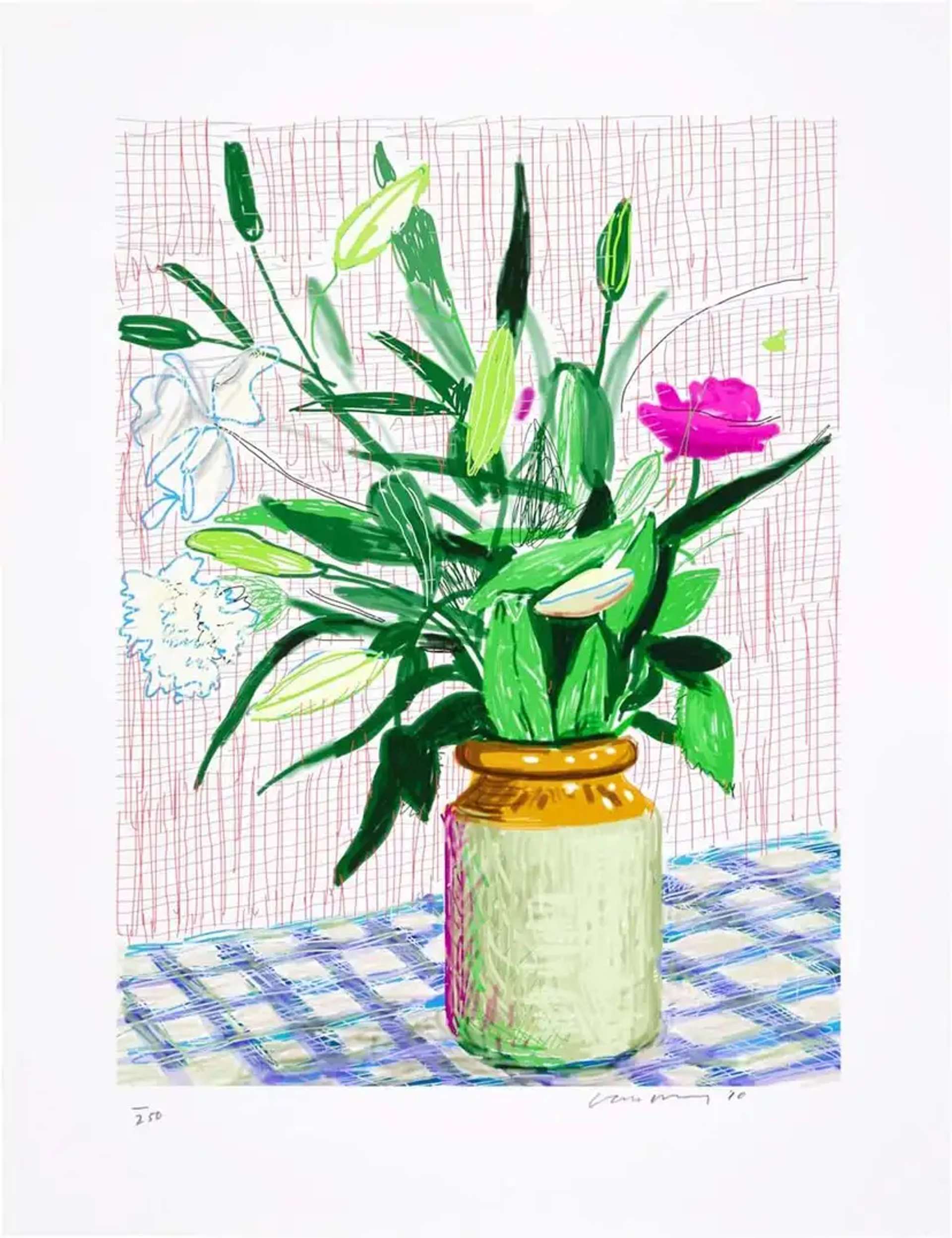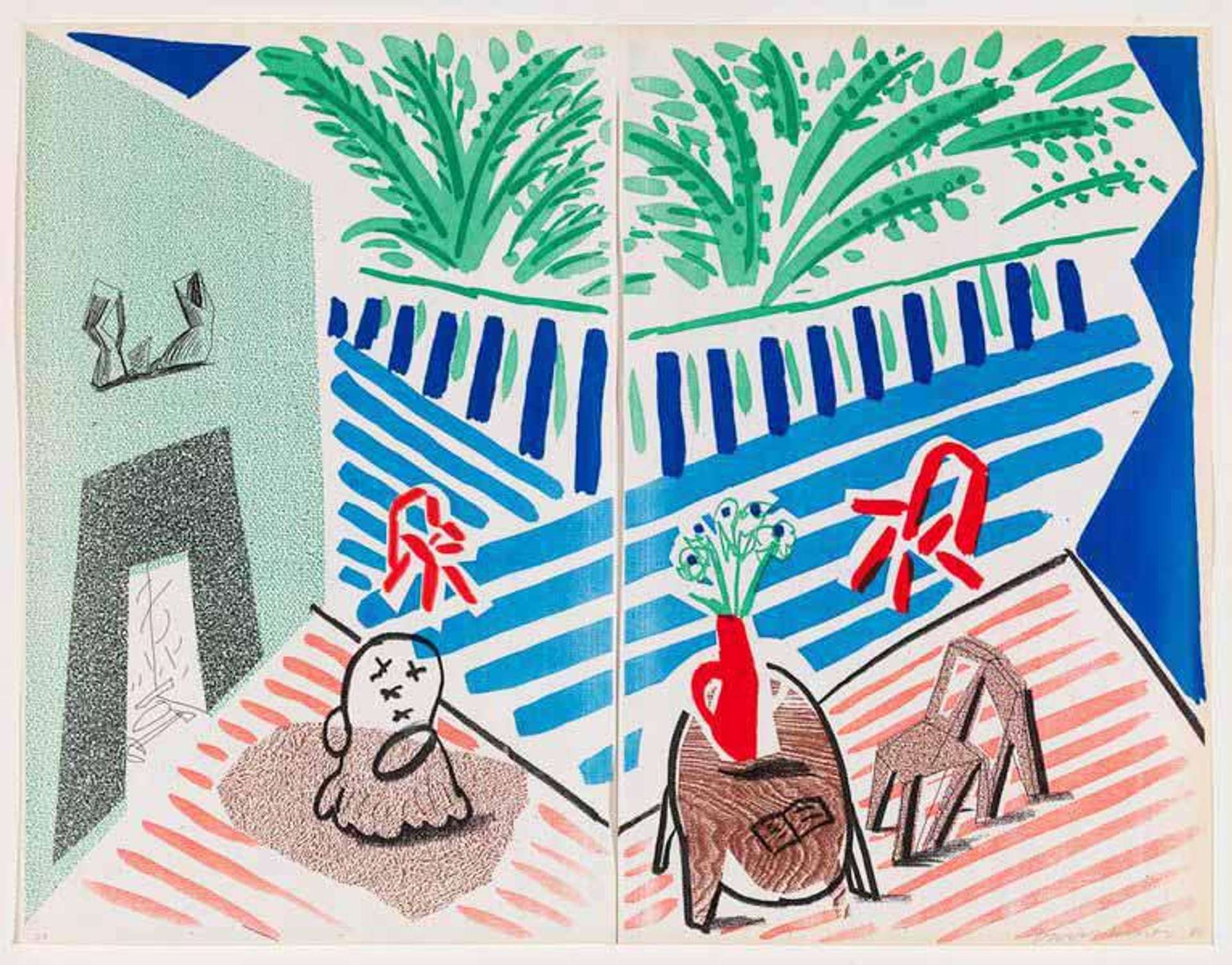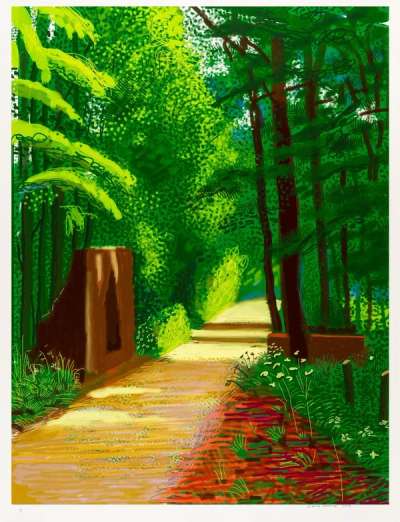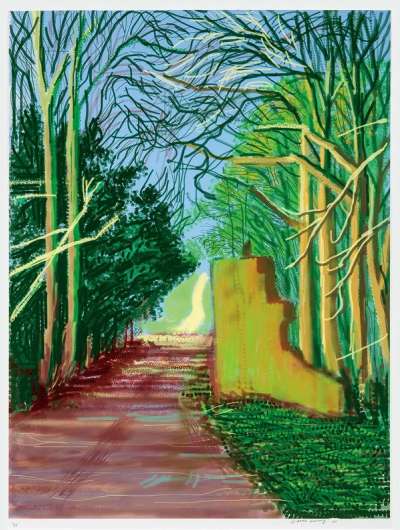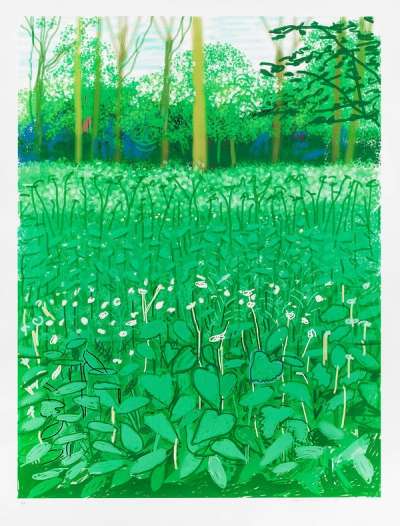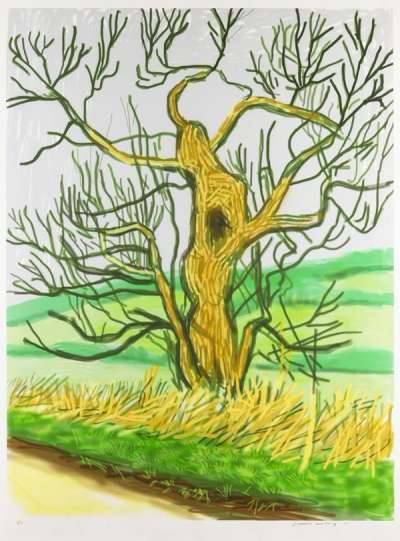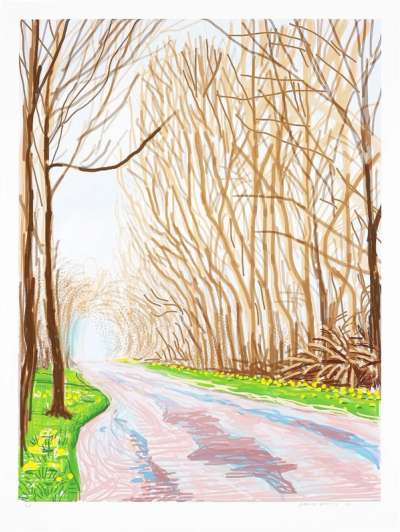The Arrival Of Spring

 The Arrival Of Spring In Woldgate East Yorkshire 17th May 2011 © David Hockney 2011
The Arrival Of Spring In Woldgate East Yorkshire 17th May 2011 © David Hockney 2011
David Hockney
654 works
A quintessential figure in the modern art world, David Hockney's journey has been marked by a relentless pursuit of artistic reinvention and innovation. This reaches a compelling crescendo in his celebrated series The Arrival Of Spring, which marries his traditional artistic roots with the cutting-edge technology of the digital age, showcasing a fascinating transition from canvas and brush to iPad and stylus. It is also a heartfelt homage to the landscapes of his native Yorkshire, after years of capturing the sun-drenched vistas of California.
Return to the Roots: Hockney's Journey Back to Yorkshire
In 2011, with the creation of The Arrival of Spring, Hockney embarked on a pivotal journey. This series marked a profound shift from the sun-drenched landscapes of California – where he had spent considerable years – to the familiar yet dramatically different vistas of his native Yorkshire. It was a return that symbolised not just a physical relocation but a deeper, more reflective turn in his artistic odyssey. Hockney's voluntary exile in California had been characterised by a fascination with light, space, and the quintessential West Coast aesthetic. His works from this period, vibrant and expansive, captured the essence of the Californian dream. However, the allure of his Yorkshire roots beckoned, drawing him back to the landscapes that had initially shaped his artistic vision.
Thus, the first The Arrival of Spring marked a homecoming as Hockney reconnected with the English countryside, with its rolling hills, changing seasons and the unique light presented a fresh canvas for Hockney's ever-evolving artistry. The Yorkshire landscapes, especially during the springtime transformation, offered a new spectrum of colours, moods and atmospheres. Hockney captured this metamorphosis with a vitality and immediacy that only his unique perspective could achieve. Each stroke reflected a deeply personal re-engagement with his roots, an artist rediscovering his first inspirations through the lens of a lifetime's experience in art.
Hockney's Art of Transformation: From Canvas to iPad
Hockney's artistic journey is a compelling narrative of evolution and reinvention. His transition from traditional printmaking to large-scale canvases and eventually to the realm of digital drawings, epitomises a relentless quest for new modes of expression. This transformative path, as evident in The Arrival of Spring, underscores Hockney's status as a contemporary pioneer.
Hockney's early forays into art were deeply rooted in printmaking. This medium, known for its precision and capacity for intricate detail, allowed Hockney to explore and refine his skills. The discipline and technique required in printmaking laid the foundation for his future explorations in colour and form, and it was a phase where Hockney mastered the art of storytelling through line and shade. As his artistic voice grew, he expanded into canvases, a shift that marked a significant growth in his creative vocabulary. These works, celebrated for their vibrant colours and bold strokes, reflected a time where Hockney captured the essence of his subjects with a newfound freedom, exploring the interplay of light, colour and perspective.
The arrival of digital technology marked the latest phase in Hockney's artistic metamorphosis. After his embrace of the iPad as his new canvas in 2010, Hockney ventured into the realm of digital drawings. This transition was a significant evolution in his approach to art, as it allowed Hockney an unprecedented level of spontaneity and fluidity. With his finger or stylus, he could instantly capture the changing scenes of the Yorkshire countryside, the shifting light, and the vibrant colours of spring with a directness that was not always possible with traditional canvas.
This digital exploration represented a fusion of his accumulated skills and experiences. The precision and attention to detail from his printmaking days, the bold use of colour and form from his canvas work, and the immediacy and flexibility of digital technology all converged in his iPad art. In The Arrival of Spring, these digital drawings stand as testament to Hockney's mastery over varied mediums, each piece a vibrant, dynamic celebration of the natural world.
The Arrival Of Spring In 2011
In the lead-up to his highly anticipated solo exhibition at the Royal Academy of Arts in London in 2012, Hockney embarked on an ambitious artistic endeavour. In January 2011, he began creating art en plein air using his iPad, inspired by the East Yorkshire landscape. This method, blending traditional outdoor painting with modern digital technology, set the stage for a groundbreaking series he would return to for several years. As Hockney set off on a mission to chronicle the transformation of the seasons from winter to summer, he eventually created over 100 captivating iPad drawings, each a vivid portrayal of the shifting moods and colours of the landscape. These drawings, characterised by their immediacy and vibrancy, captured the essence of the changing seasons with a freshness and intimacy that only Hockney's keen eye could achieve. The Arrival of Spring in 2011 highlighted the return to life of the Yorkshire nature that year.
The culmination of this series was a monumental gallery installation at the Royal Academy of Arts. Central to this was an enormous oil painting, sprawling over 32 canvases and measuring an impressive 12 by 32 feet. This painting, a testament to Hockney's mastery of scale and colour within traditional mediums, was displayed alongside 51 of the iPad drawings, printed on paper. The juxtaposition of the traditional oil painting with the digitally created works offered viewers a multifaceted experience of Hockney's artistic vision and his portrayal of the seasonal metamorphosis.
Hockney also created a video for this exhibition, which was reminiscent of his Cubist photo collages and presented a mesmerising chronicle of the same section of woods across the different seasons. By recording the woods through winter, spring, summer, and autumn, Hockney followed in the footsteps of artists like Claude Monet and captured the subtle yet profound changes in light and plant life. This visual journey through time and season added a dynamic and temporal dimension to the series, inviting viewers to immerse themselves in the cyclical beauty of nature as seen through Hockney's eyes.
The Arrival Of Spring In 2013
In the wake of a significant health scare in 2012, Hockney made a poignant decision to continue his The Arrival of Spring series the following year. Concluded in May, it marked a notable departure from his earlier colour-saturated works. Composed of 25 drawings, Hockney turned to the stark yet expressive medium of charcoal, relying solely on the interplay of light and shade to depict the changing seasons.
This series represented a reflective and introspective phase in Hockney's career. His minor stroke led to a moment of vulnerability and introspection, which seems to imbue his work with a deeper sense of immediacy. In contrast to the vibrant digital creations of his previous Spring series, the 2013 collection was an exploration of monochrome simplicity. Hockney's choice of charcoal as his medium was a return to the basics of art – a focus on the fundamental elements of form, composition and tonal variation that he excelled at in his previous forays into printmaking. Each piece, devoid of colour, spoke volumes through its gradations of grey. The absence of hue did not diminish the impact of the scenes; instead, it offered a different lens through which to view the awakening of nature. The monochrome palette brought forward the subtle textures, the play of light and shadow and the dynamic contrasts inherent in the spring landscape.
Hockney’s reliance on light and shade in these drawings was a testament to his mastery over the visual language. Each stroke of charcoal was a deliberate choice, contributing to a larger narrative about renewal, resilience, and the enduring beauty of the natural world. The series was not just a representation of the physical landscape but a metaphorical journey through the seasons of life, reflecting Hockney’s personal experiences and emotional responses to the world around him.
 Image © Royal Academy / No. 147, 5th April 2020 © David Hockney 2020
Image © Royal Academy / No. 147, 5th April 2020 © David Hockney 2020The Arrival Of Spring In 2020
As the world grappled with the unprecedented challenges of the coronavirus pandemic, Hockney embarked on a creative journey that stood in stark contrast to the global mood of withdrawal and isolation. Between February and early July, coinciding with the onset of the pandemic and subsequent lockdowns, Hockney created The Arrival of Spring in 2020 – a series that serves as a vivid celebration of the natural world and an affirmation of life amidst uncertainty.
Consisting of 116 works, this series was crafted in the serene surroundings of Hockney's home in Normandy. Utilising the iPad as his canvas, Hockney later had them printed onto paper, a process meticulously overseen by the artist himself, ensuring that each print reflected the vibrancy and detail of the original digital creation. The printed works, significantly larger than the iPad screens on which they were created, reveal the artist's hand in every stroke and mark, embodying a personal touch that connects the viewer intimately with the creator's vision.
Amidst a world paused and altered by the pandemic, Hockney's series stands as a vibrant testament to the unceasing renewal and wonder of the natural world. It was the subject of an exhibition at the Royal Academy, which opened a year after the works were created and not only showcased Hockney's artistic brilliance but also served as a powerful reminder of the resilience of life and the enduring beauty of spring. In a time marked by isolation and uncertainty, Hockney's 2020 series became a beacon of hope and joy. Through his vivid portrayal of spring in Normandy, Hockney invites us to pause, reflect, and find solace in the natural beauty that surrounds us, reminding us of the enduring capacity of art to uplift and inspire, even in the most challenging of times.
Critical Acclaim and Public Response to The Arrival of Spring
The Arrival of Spring series has received widespread critical acclaim and a strong positive response from the public, underlining its importance in contemporary art. Spanning across different years and mediums, each version of the series offers a fresh take on nature, resonating with audiences and critics alike. Hockney's pioneering integration of traditional art forms with modern technology has been particularly praised, notably visible in his iPad drawings for the 2011 and 2020 series. His foray into digital media is viewed as groundbreaking in the art world. The 2013 series, featuring charcoal drawings, was acclaimed for its introspective and powerful depiction of landscapes, demonstrating Hockney's versatility across mediums. These works are often noted for their vibrant depiction of nature and Hockney's innovative portrayal of the changing seasons, both in colour and monochrome.
The public has responded enthusiastically to The Arrival of Spring, with audiences being drawn to Hockney's vivid landscapes and fresh perspectives on familiar scenes. Exhibitions showcasing the series have attracted large and diverse crowds, indicating its wide appeal. The 2020 series resonated particularly well, offering hope and renewal in a time of global crisis. Viewers have expressed admiration for the optimism and beauty in Hockney's work, often noting how it serves as a reminder of the world's beauty during challenging times.
The series' reach, extended through various exhibitions and digital platforms, has broadened its audience, making Hockney's work accessible to both classical art aficionados and contemporary digital art enthusiasts. Throughout its iterations, Spring has marked a return to geographical roots, a change in perspective and a global crisis, acting as reaffirmation of Hockney's enduring place as a visionary in the world of contemporary art.






